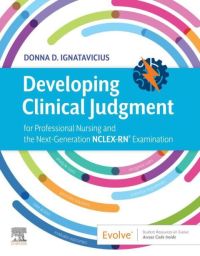Key Features
- This one-of-a-kind workbook dedicated to developing clinical judgment skills
helps prepare you for the Next-Generation NCLEX® Exam (NGN) through practical thinking exercises in which you will apply the National Council of State Boards of Nursing (NCSBN) Clinical Judgment Model (CJM).
- A comprehensive collection of carefully developed clinical reasoning exercises range from basic to more complex and address all specialty areas.
- Answer key with robust rationales to remediate learning follows at the end of the book.
- Six-part organization guides you through the entire NGN test plan.
- Answer questions in the book itself or on a companion Evolve website for automated scoring and remediation.
Author Information
By Donna D. Ignatavicius, MS, RN, CNE, CNEcl, ANEF, FAADN, Speaker and Curriculum Consultant for Academic Nursing Programs; Founder, Boot Camp for Nurse Educators and President, DI Associates, Inc. Littleton, Colorado, USA
Part 1: Introduction: The Use of Clinical Judgment in Professional Nursing Practice
1.Transitioning from the Nursing Process to Clinical Judgment
2.Applying the NCSBN Clinical Judgment Model to Ensure Client Safety
Part 2: Clinical Judgment for Clients Across the Lifespan Experiencing Commonly Occurring Health Problems
3.Perfusion: Common Problems
4.Clotting: Deep Vein Thrombosis
5.Gas Exchange: Common Problems
6.Elimination: Benign Prostatic Hyperplasia
7.Nutrition: Common Problems
8.Mobility: Common Problems
9.Metabolism: Common Problems
10.Cellular Regulation: Breast Cancer
11.Inflammation: Common Problems
12.Infection: Common Problems
13.Sensory Perception: Cataracts
14.Cognition: Common Problems
15.Mood and Affect: Depression
16.Stress and Coping: Generalized Anxiety Disorder
17.Reproduction: Uterine Leiomyoma/Hysterectomy
Part 3: Clinical Judgment for Childbearing Families
18.Reproduction: Childbearing Family
Part 4: Clinical Judgment for Clients Across the Lifespan Experiencing Complex Multi-System Health Problems
19.Perfusion: Complex Problems
20.Mobility: Spinal Cord Injury
21.Cognition: Traumatic Brain Injury
22.Infection: Sepsis
23.Gas Exchange: Chest Trauma
24.Elimination: Complex Problems
25.Metabolism: Complex Problems
26.Tissue Integrity: Burns
27.Stress and Coping: Substance Use Disorder
28.Management of Care: Complex Problems
Part 5: Pharmacology for Nursing
29.Pharmacology in Management of Common Health Problems
30.Pharmacology in Management of Complex Health Problems
Part 6: Answers and Rationales for Thinking Exercises
Answers and Rationales for Thinking Exercises
References




